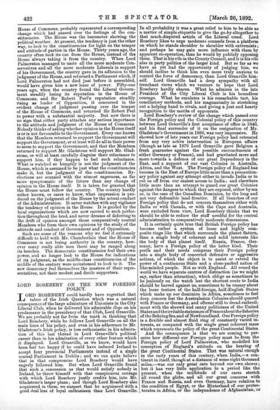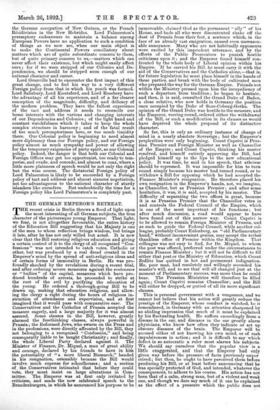LORD ROSEBERY ON THE NEW FOREIGN POLICY. -F ORD ROSEBERY
could hardly have regretted that taboo of the Irish Question which was a natural consequence of the large admixture of Unionists in the City Liberal Club, when he delivered his admirable Rog e on his predecessor in the presidency of that Club, Lord Granville. We are probably not far from the mark in thinking that Lord Rosebery, while he follows Lord Granville on all the main lines of his policy, and even in his adherence to Mr. Gladstone's Irish policy, is less enthusiastic in his admira- tion of this last thread in Lord Granville's political career than in his admiration of every other feature which it displayed. Lord Granville, as we know, would have been but too happy if be could have induced Ireland to accept four provincial Parliaments instead of a single central Parliament in Dublin ; and we can quite believe that in that compromise Lord Rosebery would have eagerly followed him. But when Lord Granville found that such a concession as that would satisfy nobody in Ireland, he threw himself with that conspicuous courage with which Lord Rosebery justly credits him, into Mr. Gladstone's larger plans ; and though Lord Rosebery also acquiesced in them, we suspect that he acquiesced with a good deal less of loyal enthusiasm than Lord Granville. In all probability it was a great relief to him to be able as a matter of simple etiquette to give the go-by altogether to that much-disputed article of the Liberal creed. Lord Rosebery likes to urge moderate counsels from a platform on which he stands shoulder to shoulder with extremists ; and perhaps he may gain more influence with them by apparent co-operation, than he would by publicly opposing them. That is his r6le in the County Council, and it is his role also in party politics of the larger kind. But so far as we have as yet had the opportunity of judging him, we should incline to think him even more truly anxious to control the force of democracy, than Lord Granville him- self. Lord Granville had a deep sympathy with all trenchant views which we venture to hope that Lord Rosebery hardly shares. What he admires in the late President of the City Liberal Club is his boundless courage. What he emulates is his remarkable tact, his conciliatory methods, and. his magnanimity in stretching out a helping hand to rivals, and giving a just and hearty recognition to the merits of opponents. Lord Rosebery's review of the change which passed over the Foreign policy and the Colonial policy of this country between Lord Granville's first acceptance of office in 1840, and his final surrender of it on the resignation of Mr. Gladstone's Government in 1886, was very impressive. He showed how of late years our Foreign policy had retreated from any very active intervention in European affairs (though as late as 1870 Lord Granville gave Belgium a fresh guarantee against the possible encroachments of either Germany or France), and had gravitated more and more towards a defence of our great Dependency in the East, and a support of our vast Colonies in Australia, Africa, and the West. The Foreign policy of England has become in the East of Europe little more than a precaution- ary policy against any attempt either to invade India or to cut us off from our easiest access to India ; and elsewhere little more than an attempt to guard our great Colonies against the dangers to which they are exposed, either by sea or, in the case of the Canadian Dominion, by the long and not very defensible land frontier. If all branches of our Foreign policy that do not concern themselves either with India or with Canada, or with the Cape and Australia, were excluded from view, Lord Rosebery thinks that we should be able to reduce the staff needful for the central administration to comparatively moderate dimensions.
It is certainly quite true that British Foreign policy has become rather a system of loose and highly com- posite rings like that which surrounds the planet Saturn, than a single body of coherent and solid interests like the body of that planet itself. Russia, France, Ger- many, have a Foreign policy of the latter kind. Their perils and their needs compress their Foreign policy into a single body of concerted defensive or aggressive actions, of which the object is to assist or extend the power of a continuous State and a close-packed nation of like-minded people. Not so with England. All round the world we have separate centres of distraction (as we might say, rather than attraction), which oblige us sometimes to be jealously on the watch lest the shortest route to India should be barred against us, sometimes to be uneasy about the loose texture of the half-foreign, half-English States which make up our dominion in Africa, sometimes to feel deep concern lest the Australasian Colonies should quarrel with France or Germany, and oftener still to dread embroil- ment with the shrewd and canny politicians of the United States and the irritable statesmen of France about the fisheries of the Behring Sea and of Newfoundland. Our Foreign policy is a flexible and almost fluid ring of constantly varied in- terests, as compared with the single great coherent mass which represents the policy of the great Continental States. And the consequence is that we are coming to per- ceive how different our Foreign policy must be from the Foreign policy of Lord Palmerston, who modelled his conception of England's attitude on the bearing of the great Continental States. That was natural enough in the early years of this century, when India,—a con- tinent in itself, though at a distance of some eight thousand miles,—was our only great care beyond our own shores ; but it has very little application to a period like the present, when the multitude of our cares stretch all round the globe, and all our great concerns with France and Russia, and even Germany, have relation to the condition of Egypt, or the Hinterland of our protec- torates in Africa, or the independence of Afghanistan, or the German occupation of New Guinea, or the French Recidivistes in the New Hebrides. Lord Palmerston's peremptory endeavours to maintain a balance among European Powers have no application to such a condition of things as we now see, when our main object is to make the Continental Powers conciliatory about matters which are of quite subordinate concern to them, but of quite primary concern to us,—matters which can never affect their existence, but which might easily affect ours ; for if we were stripped of our Colonies and De- pendencies, we should be stripped soon enough of our national character and career.
Lord Granville had to encounter the first impact of this great change, and to feel his way to a very different Foreign policy from that in which his youth was formed. Lord Salisbury, Lord. Knutsford, and Lord Rosebery have the advantage of all his experience, and of a far clearer conception of the magnitude, difficulty, and delicacy of the modern problem. They have the fullest experience of the tact and address it needs to reconcile our home interests with the various and changing interests of our Dependencies and Colonies ; of the light hand and constant watchfulness which it takes to keep the whole complex structure in harmony ; and of the fatal result of too much peremptoriness here, or too much timidity there. Our Colonial policy is beginning to need. almost more diplomacy than our Foreign policy, and our Foreign policy almost as much sympathy and power of allowing for the temporary exigencies of party spirit., as our Colonial policy. Indeed, the danger is that both our Colonial and Foreign Offices may get too opportunist, too ready to tem- porise, and evade, and concede, and almost to coax, where a little more plainness of speech would be not only the right but the wise course. The dictatorial Foreign policy of Lord Palmerston is likely to be succeeded. by a Foreign policy of tact and address and almost sinuous negotiation, not too advantageous to the national character of sturdy islanders like ourselves. But undoubtedly the time for a Foreign policy like Lord Palmerston's is completely past.



































 Previous page
Previous page